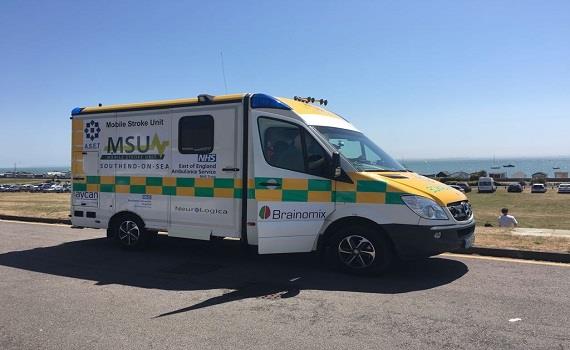Pioneering stroke schemes see significant reduction in treatment times
Date: 27 October 2023

The success of two specialist stroke schemes at East of England Ambulance Service NHS Trust (EEAST) is being celebrated ahead of World Stroke Day on Sunday, 29 October.
The two schemes have seen a significant reduction in treatment waiting times for patients who have been diagnosed with a stroke, a life-threatening medical condition that happens when blood supply to part of the brain is cut off.
The first pathway involves the use of video triaging, which enables ambulance clinicians to connect via FaceTime to senior stroke registrars and consultants, while on scene with patients. Both clinicians will agree a pathway for the patient, which has seen a reduction in the time it takes from hospital arrival to being scanned from 22 minutes down to 2 minutes and the time taken from hospital arrival to treatment from 66 minutes to 9 minutes in the fastest case.
The scheme launched in August 2022 and has one pilot site in north Cambridgeshire and a second in west Essex. An expansion is being planned with stroke centres across the region, and a further bid for use in Basildon, Broomfield, Lister, Southend and Watford hospitals has been successful. The Trust is also working with Queen Elizabeth Hospital in Kings Lynn, with the aim of launching there next month.
The second scheme is the use of a Mobile Stroke Unit, which is a specialist ambulance with advanced medical equipment on board.
The pilot scheme is a study run in partnership with Saarland University in Germany and East Suffolk and North Essex Foundation Trust. It means patients can have blood samples analysed and a CT scan in the ambulance, which identifies what type of stroke the patient is having.
The advanced unit is assigned at random to patients with a suspected stroke, alternating with a standard ambulance to form a balanced study of 850 patients, who can choose to opt-in.
Daniel Phillips, clinical lead and advanced paramedic, said: “Strokes are the third largest cause of deaths and one of the leading causes of disability. Two-thirds of people who survive one will live with some kind of disability after.
“Lots of things look like strokes and strokes look like many things. The mobile unit with the sophisticated technology on board means we can take less patients to hospital and the patients we do take will get treatment quicker than through other pathways.”
In the UK, someone experiences a stroke every five minutes. If you believe someone could be having a stroke, use the FAST test: Look for Facial weakness, Arm weakness, Speech problems, then it’s Time to call 999.
- Summary:
The success of two specialist stroke schemes is being celebrated ahead of World Stroke Day on Sunday, 29 October.
